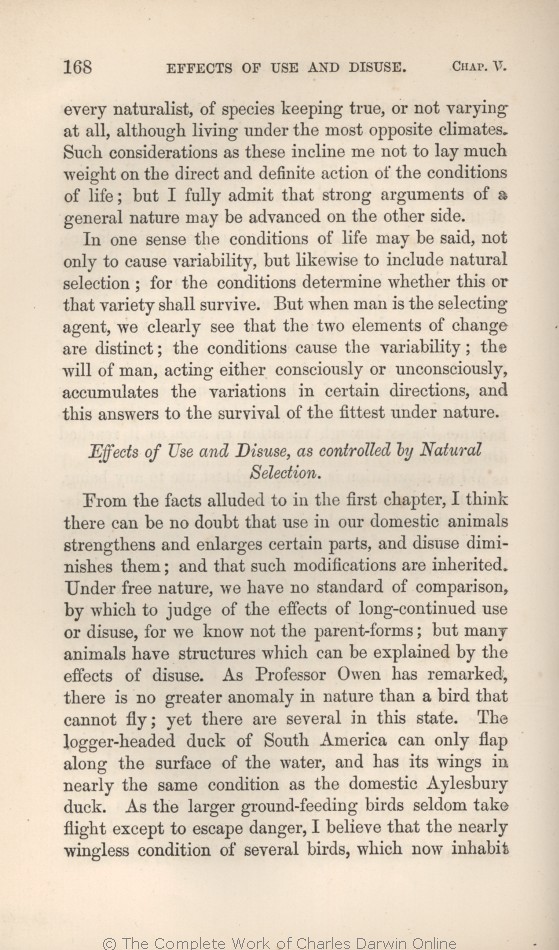every
naturalist, | naturalist, 1869 1872 | | naturalist 1859 1860 1861 1866 |
| not to lay much 1869 |
| to lay very little 1859 1860 1861 1866 |
| to lay less 1872 |
| and definite action 1869 |
| action 1859 1860 1861 1866 1872 |
| conditions of life; but I fully admit that strong arguments of a general nature may be advanced on the other side. 1869 |
| conditions of life. 1859 1860 1861 1866 |
| surrounding conditions, than on a tendency to vary, due to causes of which we are quite ignorant. 1872 |
| 1 blocks not present in 1869 1872; present in 1859 1860 1861 1866 | | Indirectly, as already remarked, they seem to play an important part in affecting the reproductive system, and in thus inducing variability; and natural selection will then accumulate all profitable variations, however slight, until they become plainly developed and appreciable by us.
|
|
|
In
one sense | one sense 1869 1872 |
| a far-fetched sense, however, 1866 |
| but 1866 1869 |
| either directly or indirectly, but 1872 |
| selection; 1866 1869 | | selection, 1872 |
| OMIT 1869 1872 |
| it depends on the nature of 1866 |
| determine whether 1869 1872 | | whether 1866 |
| survive. 1869 1872 | | be preserved. 1866 |
| when man is the selecting agent, we clearly see that the 1869 1872 |
| we see in selection by man, that these 1866 |
| ..... 1869 1872 | | essenitally 1866 |
| the conditions cause the variability; 1869 |
| the conditions under domestication causing the variability, and 1866 |
| variability is in some manner excited, but it is 1872 |
| acting either consciously or unconsciously, 1866 1869 |
| which 1872 |
| accumulates 1869 1872 | | accumulating 1866 |
| certain 1869 1872 | | cretain 1866 |
| ..... 1869 1872 | | definite 1866 |
| directions, and this answers to the survival of the fittest under nature. 1869 |
| directions. 1866 |
| directions; and it is this latter agency which answers to the survival of the fittest under nature. 1872 |
|
Effects
|
Effects
1866 1869 1872 | |
Effects
1859 1860 1861 |
|
of
1866 1869 1872 | |
of
1859 1860 1861 |
|
Use and Disuse, as controlled by Natural Selection
. 1869 |
|
Use and Disuse
.—
1859 1860 1861 |
|
Use and Disuse, as controlled by Natural Selection. 1866 |
|
the increased Use and Disuse of Parts, as controlled by Natural Selection
. 1872 |
|
From the facts alluded to in the first chapter, I think there can be
no | no 1866 1869 1872 | | little 1859 1860 1861 |
| strengthens 1859 1860 1861 1866 1869 | | has strengthened 1872 |
| enlarges 1859 1860 1861 1866 1869 | | enlarged 1872 |
| diminishes 1859 1860 1861 1866 1869 | | diminished 1872 |
| ..... 1869 1872 | | can 1859 1860 1861 1866 |
| have 1859 1860 1861 1866 1869 | | possess 1872 |
| explained 1859 1860 1861 1869 | | ex- plained 1866 | | best explained 1872 |
| duck. 1859 1860 1861 1866 1869 |
| duck: it is a remarkable fact that the young birds, according to Mr. Cunningham, can fly, while the adults have lost this power. 1872 |
| I believe 1859 1860 1861 1866 1869 |
| it is probable 1872 |
| which 1859 1860 1861 1866 1869 | which 1872 |
| inhabit 1859 1860 1861 1866 1869 | | inhabiting 1872 |
|









